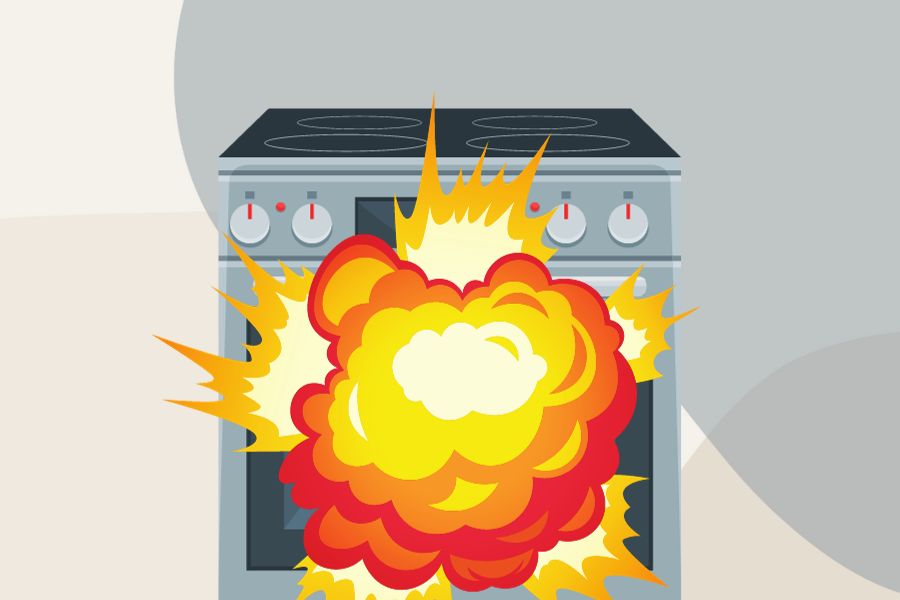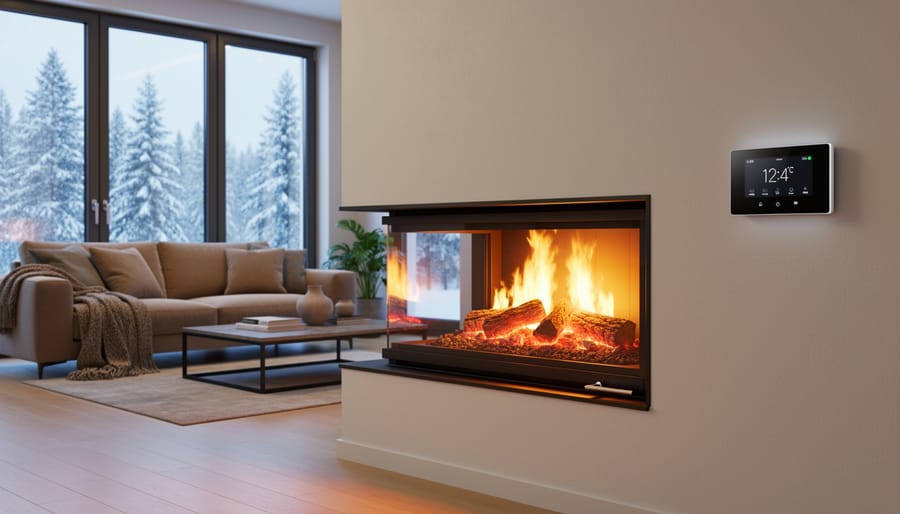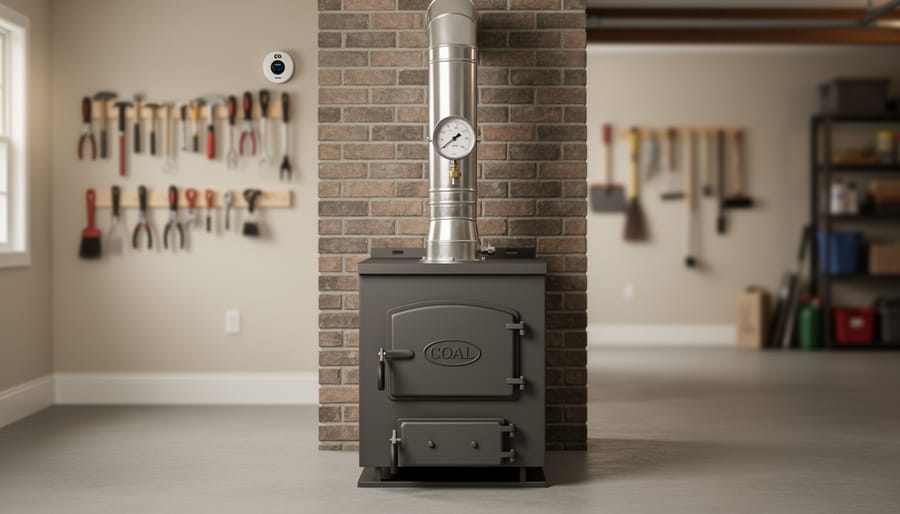Most of us have used an electric stove at some point, and we’ve probably never had any issues with them. But it’s important to know the dangers of these appliances, especially if you have children in your house or a family member who uses an electric stove often.
Electric stoves can explode—and gas stoves can get too! When I discovered that my neighbor’s wife died from a fire caused by her gas stove, I wondered how important it is to be aware of these dangers.
Gas Stoves Explosion
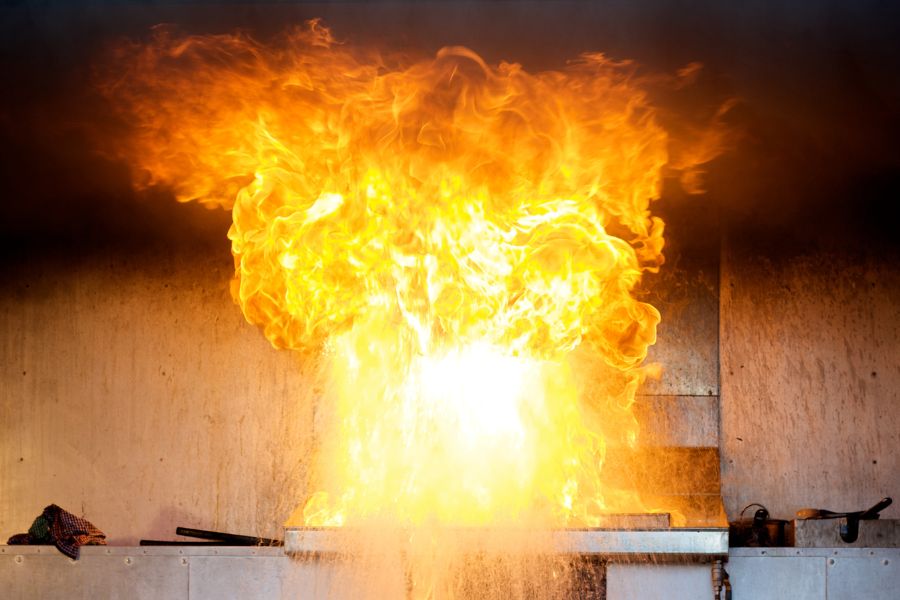
Don’t let that fact make you think that electric stoves are any safer.
Electric stoves are safe to use, but they can still explode. You may be wondering why we are talking about exploding electricity when it’s a gas stove that’s been (and will continue to be) the cause of so many home fires and deaths.
When you think of explosions, you probably imagine fireballs coming out the windows and everyone running around screaming with their hair on fire. But while gas stoves are responsible for plenty of explosions and are more dangerous than electric stoves, electricity itself isn’t exactly stable either.
There have been several cases where an electrical appliance has caught fire or exploded due to poor wiring or defective parts, even though it was plugged into a properly wired outlet with no problems before being activated by its user.
Electric Stove Mishaps
If you are worried about an electric stove explosion, don’t be. A review of the available data suggests that electric stoves are less likely to explode than gas stoves. Explosions are rare for electric stoves, but as with any appliance, some factors could lead to an explosive situation.
Electric stove explosions can happen when cooking food or cleaning your pan or stovetop. Most commonly, however, they occur because of faulty wiring and insulation in the oven itself — not necessarily because you were cooking or cleaning on it at all! When this happens, it usually causes a fire rather than an explosion (and is still very dangerous).
Suppose you have an older model that uses a pilot light instead of electricity for ignition. These accidents happen more frequently with these models because they rely solely on that small flame igniting whatever is being heated inside.
Faulty wiring and insulation aren’t typically considered possible culprits when dealing with an explosion. Still, they should be considered since they represent some very common ways in which things could go wrong without obvious warning signs beforehand like other common issues such as burning food left unattended too long would provide before reaching critical mass levels where things start going from bad to worse very quickly indeed.
What Can Cause an Electric Stove to Explode?
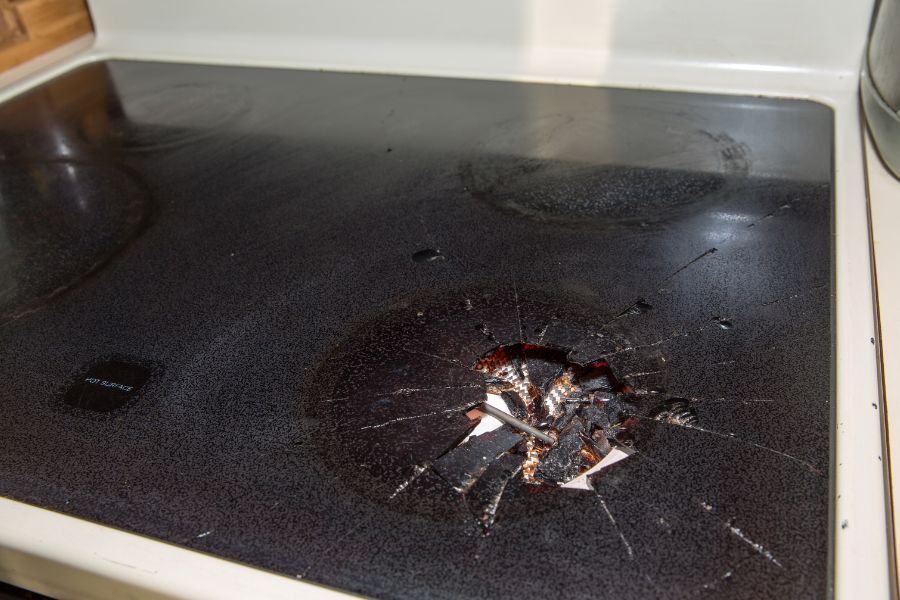
There are several reasons why an electric stove could explode.
- Overheating: The coils may overheat and catch fire if you put too many pots on your electric cooktop. Or, if you don’t clean off your cooktop after cooking something like bacon or eggs (which can splatter grease all over), that grease will burn onto the coils and cause them to overheat.
- Overloading: Your electric cooktop has a maximum output of so many watts/amps, but if you try to use more power than it’s designed for—say by using an induction burner when it’s meant for gas—it will blow out quickly.
- Improper use: If a stove isn’t vented properly (or at all), this can lead to carbon monoxide buildup in your home, which could be deadly if inhaled by humans or pets nearby. The same goes for microwaves not vented correctly; their exhaust fumes aren’t good for anyone’s health!
Tips to Prevent an Explosion
- Keep the stove clean. If a pan catches fire, it could jump to the stove and cause a larger explosion.
- Don’t overfill pots and pans. The more water or food in a pot, the longer it will take to boil, and the more likely it is that you will forget about what you are doing in front of your electric cooktop and accidentally leave it running for hours at high heat. This also means trying not to fill pots with too much liquid (making them heavier) or putting anything except water in them (so they don’t catch fire).
- Don’t use an oven that isn’t clean. Grease can accumulate on your oven’s burners or elsewhere in its chamber. In that case, this can cause fires that spread quickly when exposed again to heat from cooking appliances like stoves or microwaves nearby—or even just friction between pieces of metal inside their chambers!
- Don’t leave food unattended on top of electric stoves while they are turned on. If any spills are left behind after washing dishes off afterward (and there almost always will be), turn off the power before proceeding further into a cleanup mode. Hence, nothing goes wrong downstream because someone forgot one step amidst all these other steps listed here today.
Tips to Buy a New Electric Stove
- Consider a stove with a thermostat. This feature will prevent the cooking surface from becoming too hot, which can be dangerous.
- When shopping for an electric stove, look for one with a cool-to-the-touch surface. If it’s not cool enough to the touch, it may be too hot, and you could burn yourself!
- Check if your new electric range has any other features that might prove helpful in your kitchen: automatic shutoff, self-cleaning functionality, or an automatic ignition system make cooking on an electric range safer overall and more comfortable for those using it regularly throughout each day.
How Often Do Electric Stoves Explode?
An explosion has various causes; the most common is a gas leak. However, electric stoves are more likely than gas stoves to explode due to the heat they generate. In fact, between 2000 and 2010, there were about 1,000 injuries that resulted from exploding electric stoves in the US, compared with just over 200 for gas ones.
Electric stove explosions usually occur when food or grease builds up on the surface of your stovetop or burner plates. This happens through cooking accidents or regular use over time (like if you leave old stains). If this material sets off sparks while heating up again during cooking, it can cause a chain reaction leading to an explosion.
How Long Does It Take an Electric Stove to Catch Fire?
This is a good question because it’s not uncommon for people to be injured by exploding electric stoves.
Some stoves are more susceptible to catching fire than others—usually damaged or poorly maintained. An electric stove can sometimes catch fire in just a few seconds. In others, it can take minutes. The longest we have heard of is 10 minutes (which was pretty scary).
Stove fires can be hazardous if you are not prepared for them. If you live alone or with small children, we strongly recommend being extra careful when using your stove and keeping a fire extinguisher nearby at all times.
What to Do When Your Electric Stove Catches Fire?
If your electric stove catches fire, it is most important to turn off the power and keep children and pets away from it. If you can open a window and let some air in, that’s good too. Next, call 911! The fire department will help you put the fire out with water and a hose (if there’s no danger of electrocution).
If you have a fire extinguisher handy, use it on the flames until they go out entirely. It’s best to leave this job up to professionals because if you don’t know how to use one properly, it could worsen things by spreading smoke or exposing yourself or others to harmful chemicals in the extinguisher itself. But if there’s no one around who can help put out your burning stovetop, hopefully, these tips will give you some confidence, at least!
Electric Stove Safety Features
There are several built-in safety features that you can expect to find in an electric stove:
- A thermostat is a device that regulates the stove’s heat based on the temperature setting you have selected. It also turns off automatically when it reaches a certain temperature.
- Safety shutoff stops the flow of electricity from going through the heating element if something falls into the burner or overheats it (for example, if you accidentally leave something on top).
- Overheat protection, which shuts off the power until temperatures cool down enough for safe use again. This can happen if you turn up your stove too high and don’t notice immediately.
- A temperature probe will sound an alarm if there’s a dangerous heat level inside your oven.
How to Prevent An Electric Stove Explosion
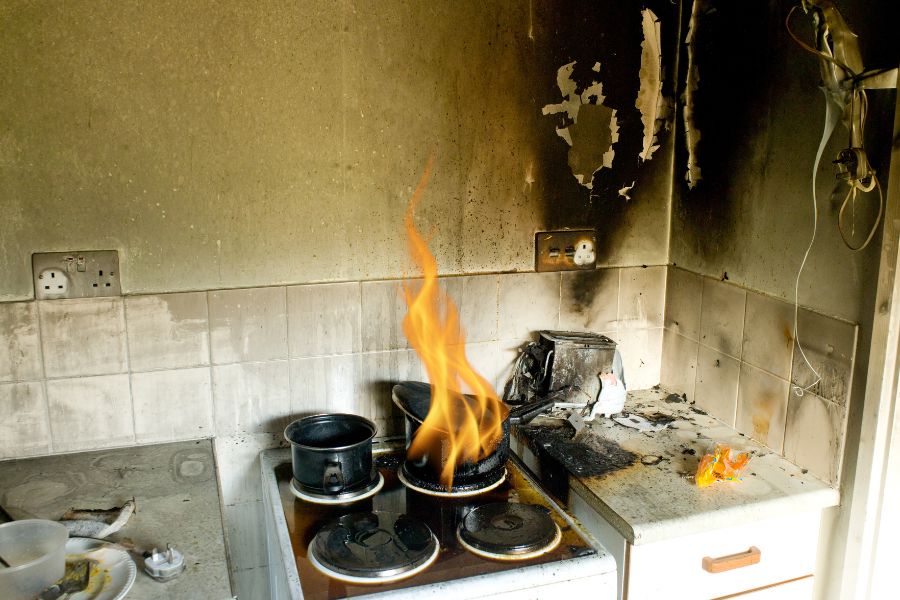
Preventing an explosion can save your life or someone else’s. If your electric stove catches fire and explodes, it is most important to turn off the stove and unplug it. Ideally, you should also call 911 so emergency responders can arrive immediately.
Here are some other tips for preventing a dangerous situation:
- Ensure your stove is switched off and unplugged before cleaning or putting away pots and pans.
- If you smell gas near the kitchen, open all doors to let in the fresh air. Then use a portable carbon monoxide detector to check for any carbon monoxide buildup (a colorless, odorless gas). If yes, evacuate immediately!
FAQs About Stove Explosion
How Often Do Gas Stoves Explode?
According to a report by The National Fire Protection Association (NFPA), an estimated average of 4,200 home fires per year start with the ignition of natural gas. These cause an average of 40 deaths per year. Gas stove explosions are pretty rare, but they can occur if there is a gas leak or a burner malfunction.
Can an Electric Oven Explode?
Yes, electric ovens can explode even though they don’t use gas. That’s because exposed wires, electrical arcs, and loose connectors can cause the air to heat and expand extremely fast. That process will cause electrical explosions that can cause injuries to you and damage to the oven. Another possible cause of oven explosion is when the glass door shatters due to thermal stress or impact.
How Long Does It Take for A Gas Stove to Explode?
The amount of time it takes for a gas stove to explode depends on a number of factors, including the size of the leak, the ventilation in the area, and the presence of a spark or flame. In general, however, a gas stove can explode within minutes of being turned on if there is a large leak and the area is not well-ventilated.
Also, Check:
- How Much Does a Stove Weigh
- How Hot Does a Stove Top Get
- Do Electric Stoves Use Gas?
- Can I Use Induction Pan on Gas Stove
- Do Home Buyers Prefer Gas Or Electric Stoves?
- Do Gas Stoves Have Pilot Lights?
- What is Auto Ignition Gas Stove?
- Can You Put Gas Stove Grates in Dishwasher?
- How To Clean Electric Stove Coil Tops?
- Do Gas Stoves Need to Be Vented
- Are Natural Gas and Propane Interchangeable
- Griddle for Glass Top Stove
Conclusion
Hopefully, we have given you insight into what can happen if your electric stove explodes and how to prevent it. We know that this is something that many people worry about, so don’t hesitate to share this post with them!

